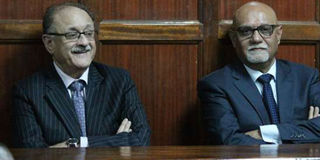Sleuths ‘may have bungled Sh1.2b case’

Anglo-Leasing scandal suspects Deepak Kamani (left) and Rashmi Kamani in a Nairobi court on October 10, 2016 during the hearing of the case. PHOTO | PAUL WAWERU | NATION MEDIA GROUP
What you need to know:
- A senior police officer, Mr Caleb Olweye, said he was asked about a security contract, which “I knew nothing about”.
- He said investigators also did not share with him info in a supplementary budget but denied that the exercise was a waste of time.
Investigators may have bungled investigations into the Sh1.2 billion Anglo-Leasing case, a Nairobi court heard Monday.
Two key prosecution witnesses told the court that they were asked “wrong questions” on the saga.
A former Director of Budget at the National Treasury, Mr Paul Maina Ngugi, said he was “unable to record a statement the way they wanted me to”, since the person who had the relevant information was his predecessor.
A senior police officer, Mr Caleb Olweye, said he was asked about a security contract, which “I knew nothing about”.
Lawyers defending the suspects on trial for fraud said the EACC investigators “were hell-bent on taking a witness in a specific direction by fielding the wrong questions”.
Mr Ngugi said: “Up to December 2003, Gerald Gicheru was in charge. I was not aware that the police modernisation project was being undertaken under the external loans Act.”
He said the government entered into a contract with SoundDay Corporation during his predecessor’s time, but the investigators asked him in 2006 to comment on the transaction.
He said the alleged offences against former Finance minister David Mwararia, ex-Permanent Secretaries Joseph Magari and Dave Mwangi, and businessmen Kamanlal Kamani and Deepak Kamani took place between October 2003 and April 2004.
In cross examination by lawyer Fred Ngatia, the witness admitted twice that it was “unfair” for investigators to ask him to comment about Sound Day Corporation on December 14, 2006 when he recorded his statement.
He said he had been asked to look into discretionary expenditures while the subject in question was in an appendix appearing under the consolidated funds services category.
The witness agreed that investigators led him to “look in the wrong place” and that the comments he made against SoundDay as not existing in the budget allocation were based on the documents shown to him, which were irrelevant.
He said the alleged offences against the accused took place between October 2003 and April 2004 “ when he was not in office”.
“They asked me if SoundDay was in the budget estimates in 2003/04, these question should have been put to (Mr) Gicheru,” the witness said.
He said investigators also did not share with him info in a supplementary budget but denied that the exercise was a waste of time.
Mr Olweye said he seeing the controversial contract he was asked about in court for the first time.
“EACC asked me about a contract I did not know. I do not know the kind of equipment alluded to in the contract,” he said, adding that the document did not have an appendix containing the details of supplies.
He added that the question investigators asked him “ were not justified” as he was then a junior officer whose role was to receive equipment an ensure their safety.
The witness said he was aware of earlier dealings with Sound Day here police had received certain supplies.
Proceedings resume today.




